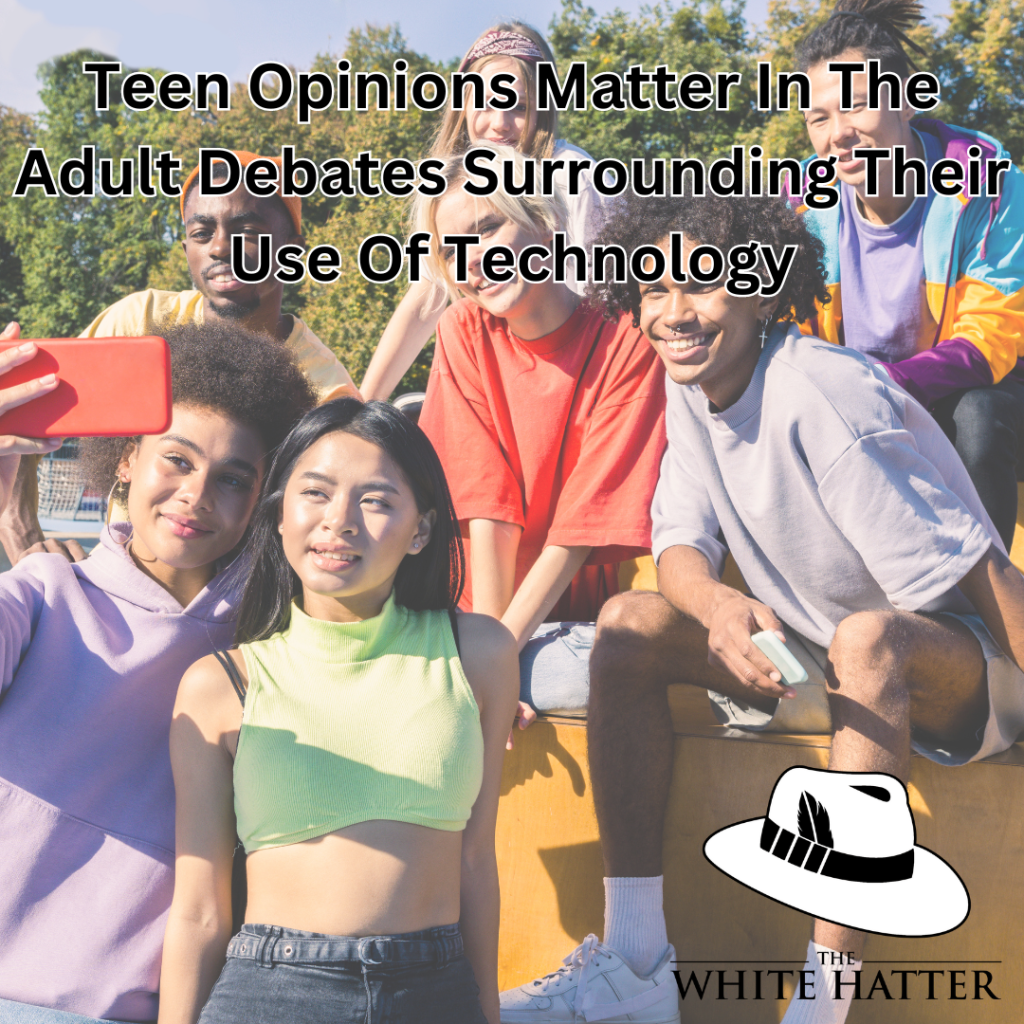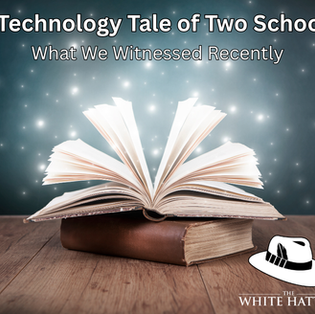The Importance of Including Teens in the Adult Conversations and Debates Surrounding Their Use of Technology!
- The White Hatter
- Oct 11, 2024
- 4 min read
Updated: May 8, 2025

The debate surrounding cellphone use among teens, particularly in schools, has gained significant traction, with many adults pushing for stricter regulations or outright bans. While these discussions are meant to ensure focus and productivity, what’s often missing is the perspective of the very group at the center of this conversation – the teens themselves. Across many discussions, we have observed that teens are beginning to express a growing sense of frustration and a fear of judgment from parents, educators, and most adults about their phone use.
Recently, there has been a strong movement among some adults to restrict or ban cellphone use based on age, or in places like schools. Many argue that these devices serve as distractions, negatively impact mental health, and contribute to poor academic performance – yet the majority of actual good academic research does not support this fact (1) There is also the concern that unrestricted phone use can expose “some” teens to inappropriate content such as pornography or increases in cyberbullying - something that we do agree with. From this lens, these concerns would appear to be valid and well-intentioned.
However, the question arises - are teens being included in these conversations about their own behaviors and habits? Increasingly, teens are expressing that the answer is a resounding “NO”. Instead, they feel that they are being judged and stereotyped as being overly dependent on technology without any real understanding or empathy toward how they see or are actually using their devices.
Many teens now share that they are experiencing a deep fear of judgment - not just in the eyes of their parents and teachers, but from a growing number of adults who adopt this anti-phone stance. They feel like they are being talked about rather than talked to. Rather than being asked what they think or feel about the potential restrictions, teens sense that the conversation is largely one-sided, where their voices are left unheard. This lack of consultation only compounds their frustration.
For many teens, phones are more than a distraction - they are a tool in today’s onlife world where technology in their lives is ubiquitous. They are a way to connect with peers, access information, and manage aspects of their lives. Yes, social media and games might take up a portion of their time, but for most, that is balanced with productive use. Teens often use their phones for schoolwork, organizing schedules, or simply keeping up with what’s happening in the world. To many, the fear of having this vital connection stripped away or heavily regulated without their input is not only frustrating but disempowering.
There is a growing frustration among teens about the way in which they are portrayed in this conversation. From their perspective, it seems like adults are rushing to conclusions and making decisions without asking them for their opinions or experiences - they are seen to be victims of technology rather victors over its use. Many teens are aware of the drawbacks of excessive phone use and are even willing to engage in discussions about healthier habits. But when adults make blanket decisions about what’s best for them, without consulting them, it comes across as dismissive. Youth have a lot to offer us adults, we adults just need to be willing to listen.
Teens may not yet have the same level of life experience as adults, but they are in tune with their own needs and the role technology plays in their day-to-day life. When the current narrative focuses on banning or restricting phone use without their input, they feel unheard, unfairly judged, and even infantilized.
If the goal is to cultivate healthier digital habits, we must make teens part of the conversation rather than sidelining them. Open dialogue between teens and adults can help bridge the gap and foster mutual understanding. It’s not just about banning phones or enforcing strict rules; it’s about teaching responsible usage, digital literacy, and critical thinking around technology – as we like to say, it’s all about “know” tech rather than “no” tech.
When teens feel that their voices are valued and that they are part of the process, they are more likely to engage positively with solutions. Instead of resorting to heavy restrictions that are pushed down their throats, which might feel punitive, finding ways to meet teens where they are and understand the complexities of their digital world can create a more collaborative atmosphere.
The movement to restrict or ban cellphone use in certain environments may have valid points, but it's crucial that teen’s voices are not left out of the conversation. Teens, like adults, are trying to navigate a rapidly changing digital landscape, and their experiences with technology are varied and nuanced. As adults, rather than focusing solely on control and regulation, we need to create spaces for dialogue, where teens feel they can share their thoughts without fear of judgment and where they feel like their opinions actually matter – they can spot lip service a mile away!
By doing so, we not only help teens build healthier relationships with their devices but also foster trust and understanding across generations. If we fail to ask teens what they think, we risk alienating them and overlooking the insights they could bring to the very issues we’re trying to address.
As Professor Helen Christensen stated, “Without the involvement of young people in co-design, services for youth are unlikely to succeed.”
It is clear that while concerns surrounding teen’s cellphone use, particularly in schools continue to grow, the exclusion of teens from these conversations undermines the efforts to create meaningful change. Teens feel misunderstood and unfairly judged when blanket policies are imposed without their input. By opening up dialogue and involving teens in the co-creation of solutions, we foster not only healthier digital habits but also mutual respect and trust between generations. As adults, we must shift from a mindset of control to one of collaboration, recognizing that teens are not merely passive consumers of technology but active participants with valuable insights. Only by listening to them can we develop effective and lasting strategies that resonate with their realities.
Digital Food For Thought
The White Hatter
Facts Not Fear, Facts Not Emotions, Enlighten Not Frighten, Know Tech Not No Tech
References:














